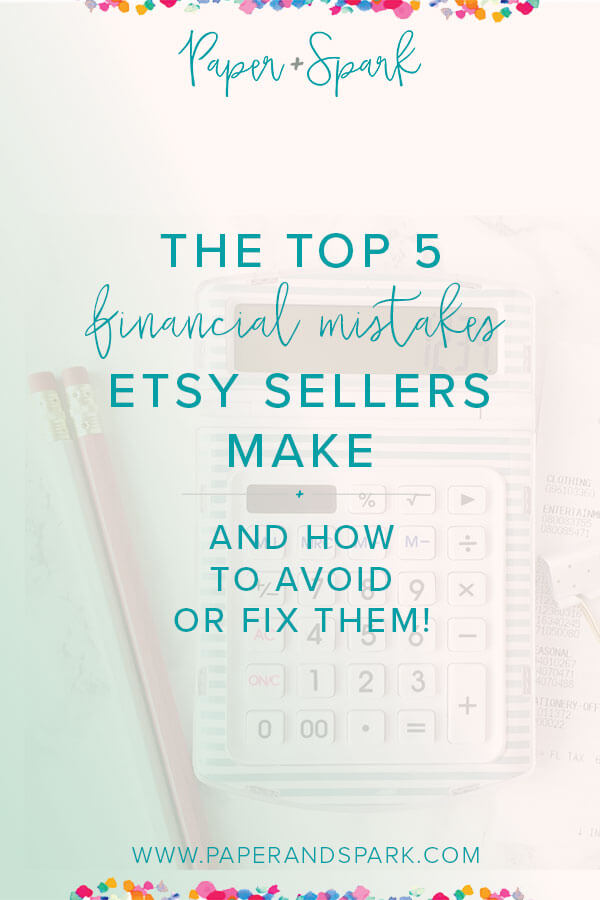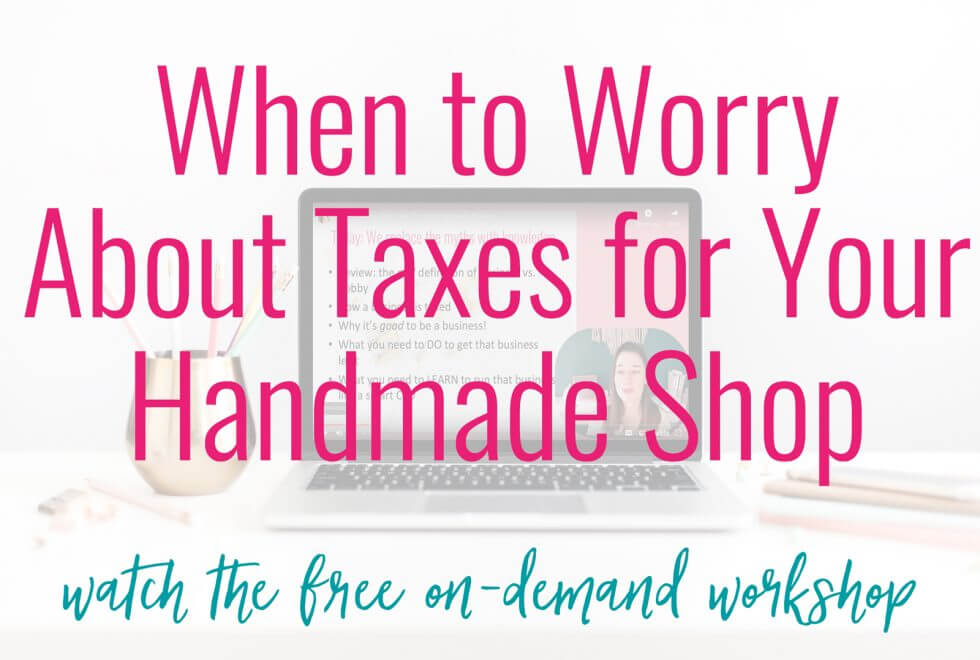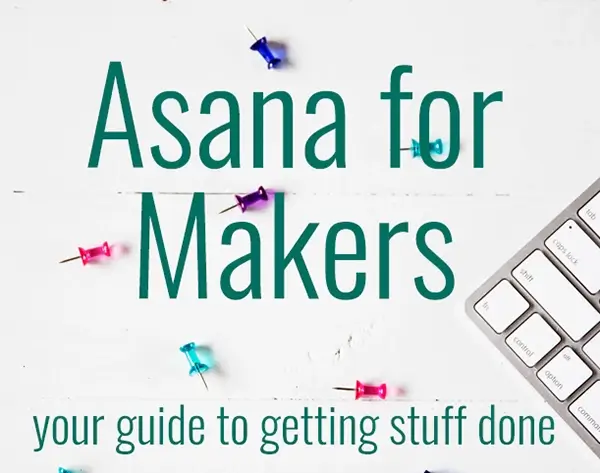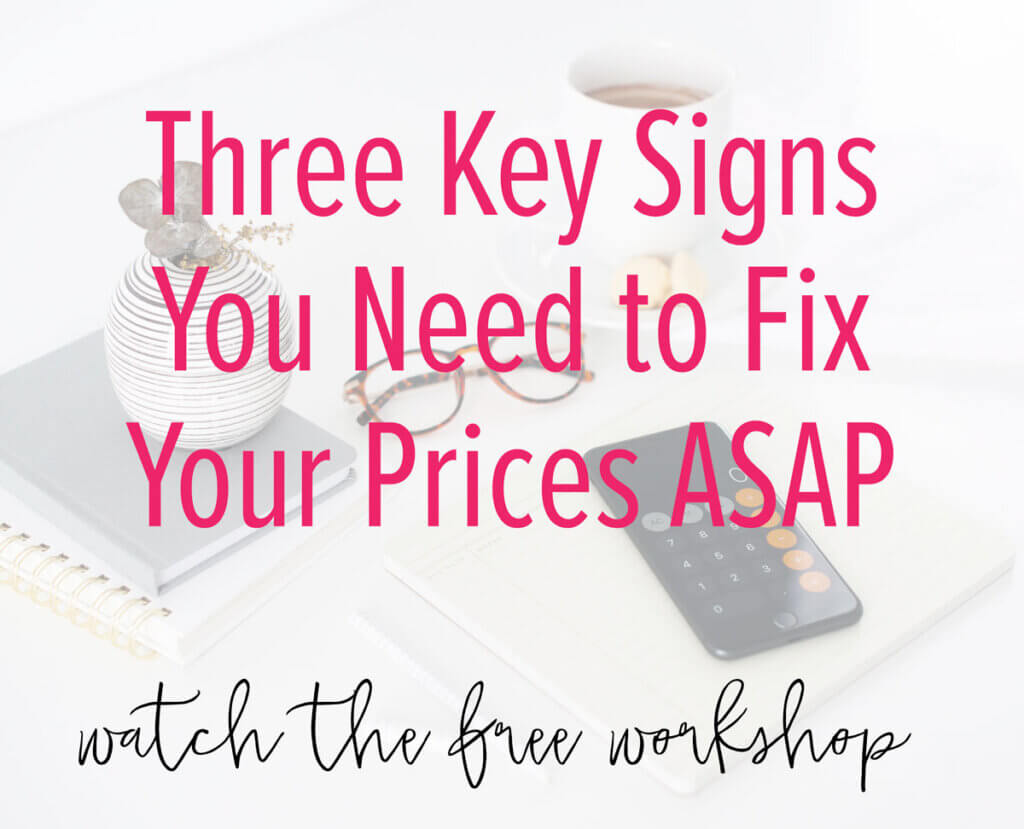As a CPA, maker, and Etsy seller myself, I’m well-versed in the financial mistakes that many Etsy sellers make. I’ve been helping makers and creative entrepreneurs get their finances in gear since 2015. So today, I’d like to briefly walk through the top five financial mistakes I see Etsy shop owners make (and how to fix them!).

Before I dive in, let me say there’s no shame in setting up your shop without fully crossing all the “T”s or dotting all the “i”s. Of course that’s the goal, but we’re human. We get so excited about out new venture, making sales, and creating pretty things. We start out with the best intentions, but it’s easy to get distracted, side tracked, confused or discouraged.
I’m not about scare tactics here, so we’ll review the mistake, take a deep breath, and then talk about how to avoid them (or fix them if you’re already there!). If you find yourself on this list, no worries. There’s almost always time to rectify your mistakes and get your shop legit. A good place to start is with this free checklist. .
TOP 5 FINANCIAL MISTAKES BY ETSY SELLERS
1. not separating business from personal funds.
I totally get that this is sometimes hard to do when you’re just setting up shop, but getting those funds separate as soon as you can afford to do so is essential for good bookkeeping practices. It’s also important in case you ever have a tax audit. I’ve got more info on how to go about setting up a separate bank account for your biz here.
2. not registering for sales tax and not charging sales tax to customers.
In the exciting period of setting up your online shop, sales tax is often an after thought. Most states require us to register for a sales tax permit and begin charging sales tax to our in-state customers from the very first sale. I’ve seen a lot of shop owners forget about sales tax, which is a bad thing because you can get hit with fines, penalties, or interest later on.
Now this is not always a mistake Etsy sellers make these days because Etsy now collects & remits sales tax for you in almost every state (more info on how that works here). But if you’re selling anywhere OTHER than on Etsy, Amazon, or eBay, you’re still on the line for collecting & remitting when needed.
It also doesn’t usually mean you’re totally off the hook – you likely still need your sales tax permit, and you still need to file your report with your state when due. Your Etsy in-state sales are likely just now non taxable or exempt.
It’s also important to note that if you sell on your own website or in-person, you likely still need to set things up to charge the appropriate customers the appropriate sales tax rate. Many sellers don’t take the time to set up the shop-side of things correctly, and then end up having to pay sales tax out of their own pocket. You want to make sure you’ve got everything running smoothly so that sales tax is correctly charged to your customers and you can easily just remit that money over to your state when due. I’ve got some more info on sales tax here.
3. not understanding what tax rules apply to them right now…or thinking there are no tax responsibilities that currently apply to them right now/yet.
Unfortunately, setting up shop doesn’t come with a handy Tax 101 manual (although this checklist is a great place to start!). Lots of Etsy sellers are unclear on what tax requirements apply to them and at what point in time. Many think they can just set up shop and experiment for a bit before becoming an official “real business”. I see a lot of Etsy sellers try to skate under the radar until, months or years later, they realize they’ve been doing something wrong and get hit with the overwhelming task of trying to back track.
Don’t fall into the trap that hobbies don’t have tax responsibilities. And don’t get confused about whether you even really are a hobby vs. a business. It’s up to you to get up to speed on what financial stuff you need to be dealing with from Day 1, so take the time to take control, get educated, and get help if you need it.
A great place to get started learning more about this question is my free 45 minute workshop here.
4. not recording transactions in a bookkeeping system.
This sort of ties in with the previous point. A lot of online sellers put off dealing with the bookkeeping side of things until they make more money, or “really become a business”, or eventually hire an accountant. Even if you’re not making much in sales, recording those expenses is a really good idea. Having records of them means more tax deductions later on.
Setting up good habits now is great for when your business eventually is rolling in the dough (that’s the goal, right?!). You never know at what point things are going to take off and you’re scrambling to set up a system. Back tracking on re-creating a year’s worth of financial transactions is probably the biggest, most time-consuming and frustrating mistake I see Etsy sellers make. (That’s why I created an entire course just to help with that! But if you do it right, you don’t need my course haha!)
5. not understanding what inventory is for tax purposes and how it applies to them.
Oooh inventory. Another common mistake I see is handmade sellers getting surprised by the concept of inventory, especially when it comes to taxes. They’re a year or two into their journey of selling, with thousands of dollars tied up in their fabric/bead/paint stash, and then they learn about inventory. Then it looks a lot like this:
Having to backtrack on dealing with inventory is no fun. So it’s important to get up to speed on the topic and understand how inventory is reported on your tax return and how you should be recording it throughout the year to make your life easier.
HOW TO FIX THESE MISTAKES
If you read through any of these points with one eye open, feeling a little flutter of dread in your stomach, it’s ok. If you have any doubts about whether you’re “doing it right”, now’s the time to make figuring it out a priority. It’s never too late to get legit, but sooner is always better than later.
Make a list of the topics and concepts that you need clarity on, like how income tax works or getting a better understanding self-employment tax. A great place to start learning about a lot of these topics is right here on this website. Click any of the above links to get started learning about sales tax, inventory, income taxes, hobby vs business, and much more.
Make a list of the action tasks you know you still need to do, and be specific. That might be steps like recording 6 months worth of inventory purchases, getting your sales tax permit, or finally opening that separate bank account.
Just getting it down on paper makes it less overwhelming. Getting clear on what needs to be done is sometimes half the battle (we don’t know what we don’t know!). Tackle these items in baby steps.
If you’re looking for guidance, I’ve got a comprehensive resource that covers ALL these concepts + action tasks and more. It’s called the Get Legit Toolkit and you can learn more here. Utilizing the Toolkit will save you tons of time and overwhelm trying to figure out these things on your own. When you’re done with this course, you’ll have set up the cornerstones of your shop’s financial foundation and be confident about your responsibilities as a shop owner. The Get Legit Toolkit is usually open for public enrollment just twice a year, so make sure to join my email list if you want in on the action!
If you happen to miss the open enrollment period for the Get Legit Toolkit, you can still grab the free checklist that walks you through what you need to do to get your shop’s financial foundation LEGIT here .












Ahhh . . . number 5! I KNEW I was missing something!
So happy I came across this article and your tools! I am about two years into studying jewelry materials and design and have held off on selling even one thing because I feel it’s necessary to put these things in place first and not have to backtrack later. Finally, a resource that gets it!
Happy to help Beverly!!
Thank you so much for putting this together. I havent started a shop yet Im in research mode and this was so helpful!
What about taxes if you live in a state without sale tax
Your articles are so helpful, thank you for writing them! I have a question about inventory. I have been selling on Etsy, and also in some local markets, and keep learning more about my taxes every year. I have been reporting everything on a schedule C using the cash method, but I have not been using inventory since most of my products are made to order. But, as I have more items that I keep in stock or have on hand, I am realizing that I should be keeping track of inventory and using the Cost of Goods Sold. My question is how to I start suddenly reporting inventory on my taxes when I wasn’t before. Will that look strange to the IRS, or can I just start now and calculate inventory as best I can with what I have and keep better track going forward? Thanks so much!
Where on Etsy does it show to add the taxes or is it added automatically?
Thank you very much
Dixie
I’m just beginning to build my Etsy shop. I have a handful of wreaths already made. It’s early enough in the new year to do this right.
I do have inventory and I can’t let that be my downfall.
How can I follow you?
Ahhh . . . number 5! I KNEW I was missing something!
So happy I came across this article and your tools! I am about two years into studying jewelry materials and design and have held off on selling even one thing because I feel it’s necessary to put these things in place first and not have to backtrack later. Finally, a resource that gets it!
Happy to help Beverly!!
Thank you so much for putting this together. I havent started a shop yet Im in research mode and this was so helpful!
What about taxes if you live in a state without sale tax
Your articles are so helpful, thank you for writing them! I have a question about inventory. I have been selling on Etsy, and also in some local markets, and keep learning more about my taxes every year. I have been reporting everything on a schedule C using the cash method, but I have not been using inventory since most of my products are made to order. But, as I have more items that I keep in stock or have on hand, I am realizing that I should be keeping track of inventory and using the Cost of Goods Sold. My question is how to I start suddenly reporting inventory on my taxes when I wasn’t before. Will that look strange to the IRS, or can I just start now and calculate inventory as best I can with what I have and keep better track going forward? Thanks so much!
Where on Etsy does it show to add the taxes or is it added automatically?
Thank you very much
Dixie